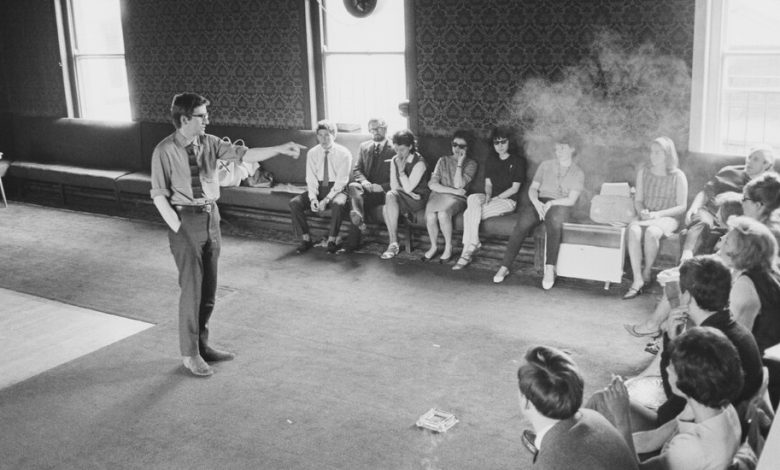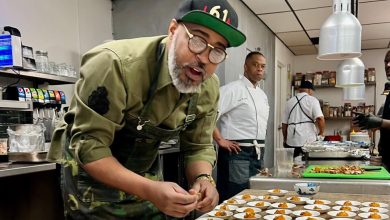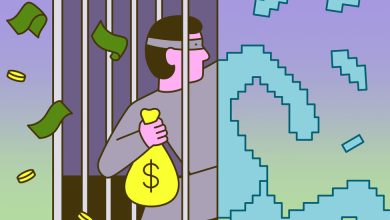Keith Johnstone, Champion of Improvisational Theater, Dies at 90

Early in what became a career in theater, Keith Johnstone was commissioned to write a play for a new company in England and studied up for the job by watching the troupe’s actors rehearse someone else’s play. What stood out to him was not the rehearsal techniques, but the fact that he found the sessions boring — “until the actors broke for coffee or stagehands began moving sets around the stage.”
“It was only at these times that there seemed to be moments of truth on the stage,” he told The Calgary Herald many years later, in 1982. “When they resumed acting, the performers abandoned their kinetic dance and entered separate glass cages.”
That realization helped fuel Mr. Johnstone’s determination that theater and the people who practiced it could benefit from more spontaneity and creativity, and from emphasizing the quest for truth over the mastery of actorly techniques.
He spent the rest of his career preaching the gospel of improvisation, developing games, exercises and live shows that were the opposite of tightly scripted theater. His 1979 book, “Impro: Improvisation and the Theatre,” is among the most widely used texts in the world of improvisational theater, and the Loose Moose Theater Company, which he created in 1977 after relocating to Canada, became an institution in Calgary.
Mr. Johnstone died on March 11 in Calgary. He was 90.
Theresa Robbins Dudeck, his literary executor and the author of “Keith Johnstone: A Critical Biography” (2013), confirmed the death.
Mr. Johnstone didn’t invent improv, and he wasn’t alone in promoting the technique; the actress and educator Viola Spolin published “Improvisation for the Theater” in 1963, and troupes like the Second City in Chicago, founded in 1959, were also working the territory. But his contributions were considerable. Among Mr. Johnstone’s liveliest innovations was Theatresports, an idea he began to develop in England when he and some colleagues at the Royal Court Theater took notice of the liveliness of audiences at professional wrestling matches.
“Our Royal Court audiences were like whipped dogs in comparison,” he wrote in an essay about Theatresports, “probably because once an event is categorized as ‘cultural,’ it becomes a minefield in which your opinion can damn you.”
So he began honing a sort of competitive event in which teams of improvisers would try to outdo each other, with audience howling and booing encouraged and judges rating the efforts.
“The judges award points by holding up cards that range from one to five,” he wrote in another book, “Impro for Storytellers” (1999). “Five means excellent, one means bad, and a honk from a rescue horn means ‘kindly leave the stage.’”
He introduced Theatresports once he had relocated to Canada, and the concept caught on; variations of the games were soon being performed all over the world.
“If the performance has gone well,” he wrote, “you’ll feel that you’ve been watching a bunch of good-natured people who are wonderfully cooperative, and who aren’t afraid to fail. It’s therapeutic to be in such company, and to yell and cheer, and perhaps even volunteer to improvise with them. With luck you’ll feel as if you’ve been at a wonderful party; great parties don’t depend on the amount of alcohol, but on positive interactions.”
Donald Keith Johnstone was born on Feb. 21, 1933, in Brixham, on England’s southwestern coast, to Richard and Linda (Carter) Johnstone. When he was 9 or so, he decided to stop taking things at face value.
“I began reversing every statement to see if the opposite was also true,” he wrote in his 1979 book. “This is so much a habit with me that I hardly notice I’m doing it anymore. As soon as you put a ‘not’ into an assertion, a whole range of other possibilities opens out.”
He trained as a teacher at St. Luke’s College in Exeter and began teaching at a primary school in South London. When he won a prize in a short-story contest, the English Stage Company, a new troupe based at the Royal Court, invited him to write a play for it, which he did: “Brixham Regatta,” which Patrick Gibbs of The Daily Telegraph thought was, for a 25-year-old novice, “a creditable — and ambitious — first play.” More important, he joined a writers’ group at the Royal Court and found himself leading improvisational exercises for the group.
He spent 10 years at the Royal Court, leading classes and workshops, screening scripts and producing plays. In July 1959 Mr. Johnstone and William Gaskill produced a largely improvised one-night show called “Eleven Men Dead at Hola Camp,” featuring Black actors ad-libbing scenes about an infamous 1959 massacre of detainees by British troops in Kenya. Alan Brien, reviewing the performance in The Spectator, was not on board with the concept, saying that it “shows the Royal Court in its most militant, inept, radical, ambitious and pretentious mood.”
“‘Eleven Men Dead at Hola Camp’ was neither good rhetoric nor good theater,” Mr. Brien wrote. “But if it sent the audience home to study the facts, it will have been worthwhile. And if it sent the producers home reconvinced that acting discipline and writing economy are the heart of drama, then it will also have been worth while.”
It did not “reconvince” Mr. Johnstone of that. He continued to develop his improvisation exercises and in the mid-1960s formed an improvisational troupe, the Theater Machine, which performed all over England as well as abroad.
In 1972 Mr. Johnstone was offered a two-year visiting professorship at the University of Calgary in Alberta. He ended up staying at the university for 23 years, taking emeritus status in 1995.
An early performance by his Loose Moose company, in 1977, was a version of “Robinson Crusoe” that, from Louis B. Hobson’s enthusiastic review in The Calgary Albertan, sounds as if it came close to replicating that professional-wrestling excitement Mr. Johnstone had longed for.
“The audience, which is seated in a semicircle, becomes everything from shark-infested waters to offstage spirit voices,” he wrote. “It is a stormy, noisy sea that surrounds Crusoe’s island, and one that never calms down for the play’s 40 minutes.”
Mr. Johnstone’s marriage to Ingrid Von Darl ended in divorce in 1981. He is survived by a son from that marriage, Benjamin; a son from another relationship, Dan; and a grandson.
Mr. Johnstone’s books and methods have been used in high school classrooms and drama clubs, professional acting workshops and anyplace else where creativity needs to be unlocked and spontaneity encouraged. A passage in his 1979 book describes what set him on the improvisational path.
“I began to think of children not as immature adults,” he wrote, “but of adults as atrophied children.”





